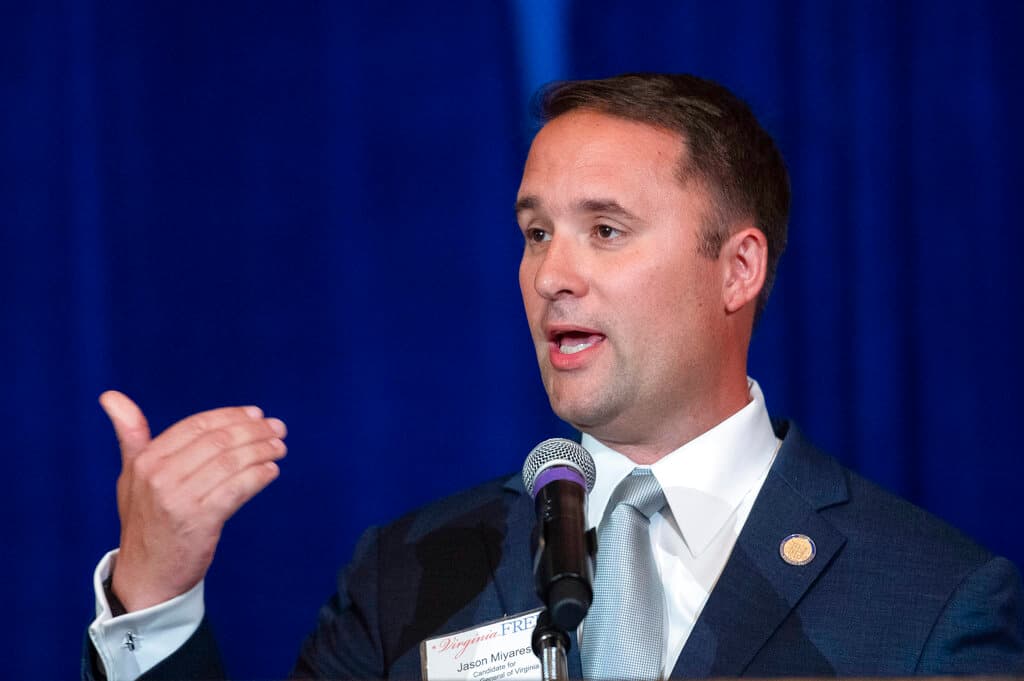Supreme Court Allows Virginia To Purge Non-Citizens From Its Voter Rolls
The Justice Department had sued Virginia for trying to cancel the voter registrations, arguing that the state could be removing citizens who mistakenly identified as noncitizens.

The Supreme Court is letting Virginia proceed with its effort to purge self-identified noncitizens from its voter rolls, granting the Old Dominion’s request for an emergency stay after lower courts halted the move.
The dispute will now go back to the lower courts for resolution, according to an order by the Supreme Court released Wednesday morning.
The attorney general of Virginia, Jason Miyares, said on Monday that the state filed an emergency stay with the high court to block a lower court’s order to reinstate 1,600 voter registrations of self-identified noncitizens.
In August, Governor Youngkin ordered a daily review of voter records to ensure that noncitizens were not registered to vote. The state sought to purge more than 1,600 people it said self-identified as noncitizens after giving those individuals two weeks to correct an error if they mistakenly checked a box on a registration form and misidentified themselves.
The Justice Department sued Virginia for trying to cancel the voter registrations, arguing that the state could be removing citizens who mistakenly identified as noncitizens.
The Supreme Court’s stay will remain in place until the Fourth Circuit of the United States Court of Appeals decides whether or not to take up the case. If the appeals court declines to hear the case, Wednesday’s order states, the stay will “terminate” automatically.
On Friday, a District Court judge, Patricia Giles, granted an injunction brought against Virginia and ordered it to reinstate the canceled voter registrations. She said state officials did not have evidence to show the individuals who had their voter registrations canceled were noncitizens. She also said the state’s automated system violated the National Voter Registration Act.
An attorney for Virginia, Charles Cooper, conceded in court that there may be some citizens among the 1,600 who mistakenly identified as noncitizens. However, he said requiring Virginia to reinstate all 1,600 individuals would mean “there’s going to [be] hundreds of noncitizens back on those rolls.”
Virginia filed its stay with the Supreme Court after an appeals court, in a rare Sunday night ruling, declined to overturn Judge Giles’ order.
A three-judge panel for the 4th Circuit Court of Appeals said Virginia is “able to prevent noncitizens from voting by canceling registrations on an individualized basis or prosecuting any noncitizen who votes.”
However, the judges said Virginia’s automated system for identifying noncitizens violated a 90-day quiet period ahead of an election that prevents states from making major changes to their voter rolls implemented under the National Voter Registration Act of 1993.
“If a noncitizen votes, it cancels out a legal vote. And that is a harm,” Mr. Cooper said.
After Judge Giles’ ruling, Mr. Youngkin said, “Let’s be clear about what just happened: only eleven days before a Presidential election, a federal judge ordered Virginia to reinstate over 1,500 individuals — who self-identified themselves as noncitizens — back onto the voter rolls. Almost all these individuals had previously presented immigration documents confirming their noncitizen status, a fact recently verified by federal authorities.”
Mr. Miyares said the Justice Department’s lawsuit against Virginia was an attempt to “weaponize the legal system against the enemies of so-called progress.”
“That is the definition of lawfare. To openly choose weaponization over good process and lawfare over integrity isn’t democracy: it’s bullying, pure and simple, and I always stand up to bullies,” he added.

